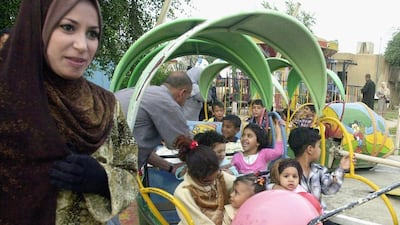Nostalgia for a more united, tolerant and peaceful Middle East seemed to capture the hearts and minds of those celebrating the holy month of Ramadan this year.
Reminiscing about “the good old days”, regardless of whether they ever actually existed in the form being remembered, became a popular pastime.
So it should come as no surprise that following a somewhat subdued Ramadan due to the ongoing conflicts in Syria, Iraq, Palestine and Yemen, including sectarian attacks in Saudi Arabia and Kuwait, Arabs of all ages could be seen singing along to one of Eid’s most cheerful anthems from the 1980s which was revived yet again on TV for Eid last weekend.
Just singing the first line “Ahlan ahlan bel Eid/ Marhab marhab bel Eid” (Welcome, oh welcome Eid/ Greetings, oh greetings to Eid) followed by the happy hooray that everyone knows by heart, brought the atmosphere alive: “He he heey/ He he he, heey”.
Last Friday, on the first day of Eid, I saw an entire restaurant join in with a family who had started to sing El Seoud’s hit during lunch in Dubai; no one seemed to care how ridiculous they looked madly hooraying.
Called Welcome Eid, the song was originally made popular by the iconic Egyptian singer, actress and TV presenter Safaa Abou El Seoud, who retired from the public eye following her marriage to the Saudi businessman and founder of ART TV, Saleh Abdullah Kamel. The music video has an almost cult-like status and shows El Seoud with an enormous bouffant hairdo, dancing and singing, with children joyously waving balloons, enjoying rides in the park and running through the streets. "He he heey/ He he he, heey" indeed.
Across generations, from grandparents to grandchildren, the song is remembered and shared as joyous proof of a more innocent time.
“It is just so contagious and happy,” says Alia Ahmed, an Emirati in her 30s, who taught it to her children. “No Eid is complete without this song, and we especially need happy songs these days.”
Reading the lyrics, the song also contains positive messages of love, wishing others well, of giving and prayers: “Hope the whole world remains happy ... and we remain brothers, inside out,” El Seoud sings.
In many ways, the song also reflected the themes of popular dramas televised during Ramadan, such as Haret El Yahud (The Jewish Quarter), a controversial series set in Cairo in the 1950s in a neighbourhood in which Jews, Muslims and Christians all lived together harmoniously.
Given the growing polarisation in Egypt and across the Arab world over politics and faith, its broadcast is timely and its aim to revive a sense of tolerance and understanding to be applauded.
The series is careful to distinguish between the religion of Judaism and Zionism, the movement established to create a Jewish homeland. A hundred years ago, Egypt had a thriving Jewish community of 80,000 or more. Now there are reportedly fewer than a dozen Egyptian Jews left in Cairo and the city’s old synagogues have fallen into disrepair.
There used to be Jewish quarters in almost every city in every Arab country, but most have long been renamed, their stories forgotten.
To take one example, amid the glitz of downtown Beirut, the rundown 1925 Magen Abraham Central Synagogue has been renovated but remains largely empty. The Jewish community in Beirut is estimated to be fewer than 100 these days, but once numbered as many as 14,000 and can trace its roots back to 1000BC.
The Jewish faith is one of 18 religions officially recognised in Lebanon but its people generally keep their religious identity a secret for fear of reprisals.
But perhaps one of the strongest messages of tolerance, unity and living in peace was to be found in an unprecedented kind of advert on Arab satellite channels decrying sectarianism. With a hashtag of #IAmKuwaiti #OneKuwait, which trended on Twitter across the Arab world after the suicide bombing in Kuwait of a Shiite mosque, we see a child coming into the living room and asking his father: “Am I Sunni or Shiite?” His father replies: “You are both. Our God is one ... and, if someone asks if you are Sunni or Shiite, you tell him, ‘I am Kuwaiti’.”
Even the fantasy-filled production of Alf Laila Wa Laila (The Arabian Nights), another series filmed for Ramadan this year, which has been called an Arabised Games of Thrones, chose for its plots tales related to good and evil.
No one, it seemed to say, with its stories of white and black magic, is truly evil and no one is completely good. At its heart is a message of forgiveness and the acceptance of difference.
As the Arab world hopes for an evermore elusive happy and peaceful time, the beloved old Eid song echoes the dreams of its fans: “Say after me, say after me, Oh God increase happy times in our lives and add more blessings ...”.
Rym Ghazal is a senior feature writer and columnist with The National.

